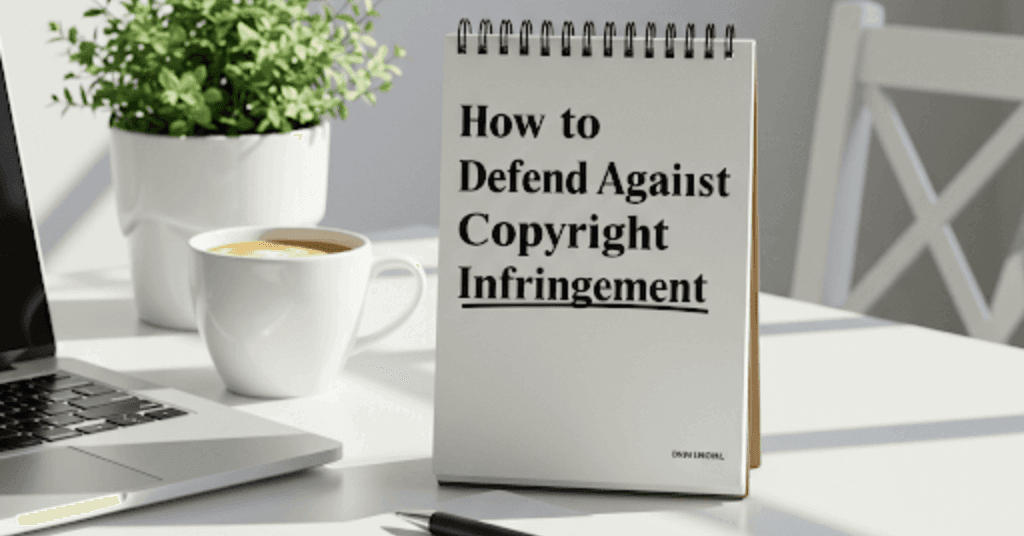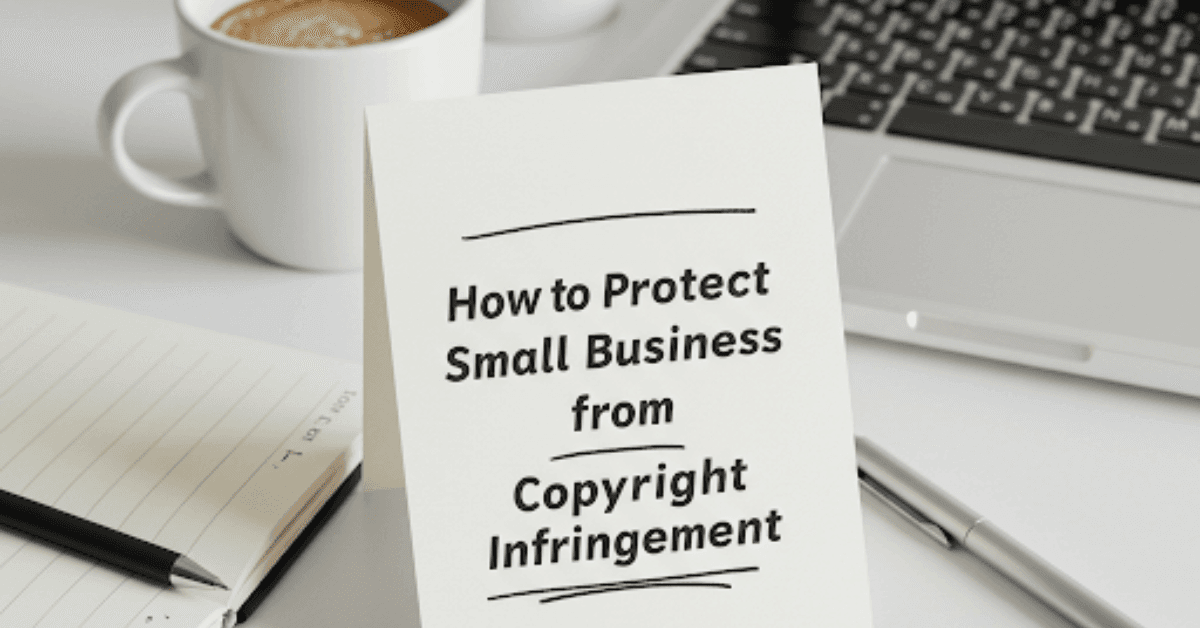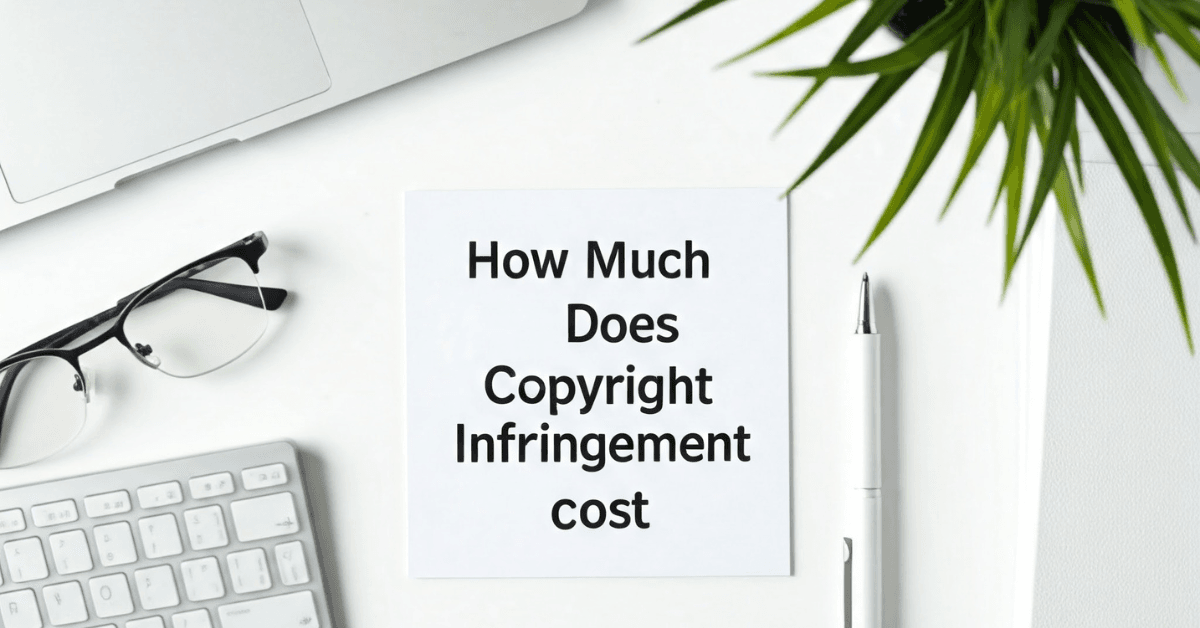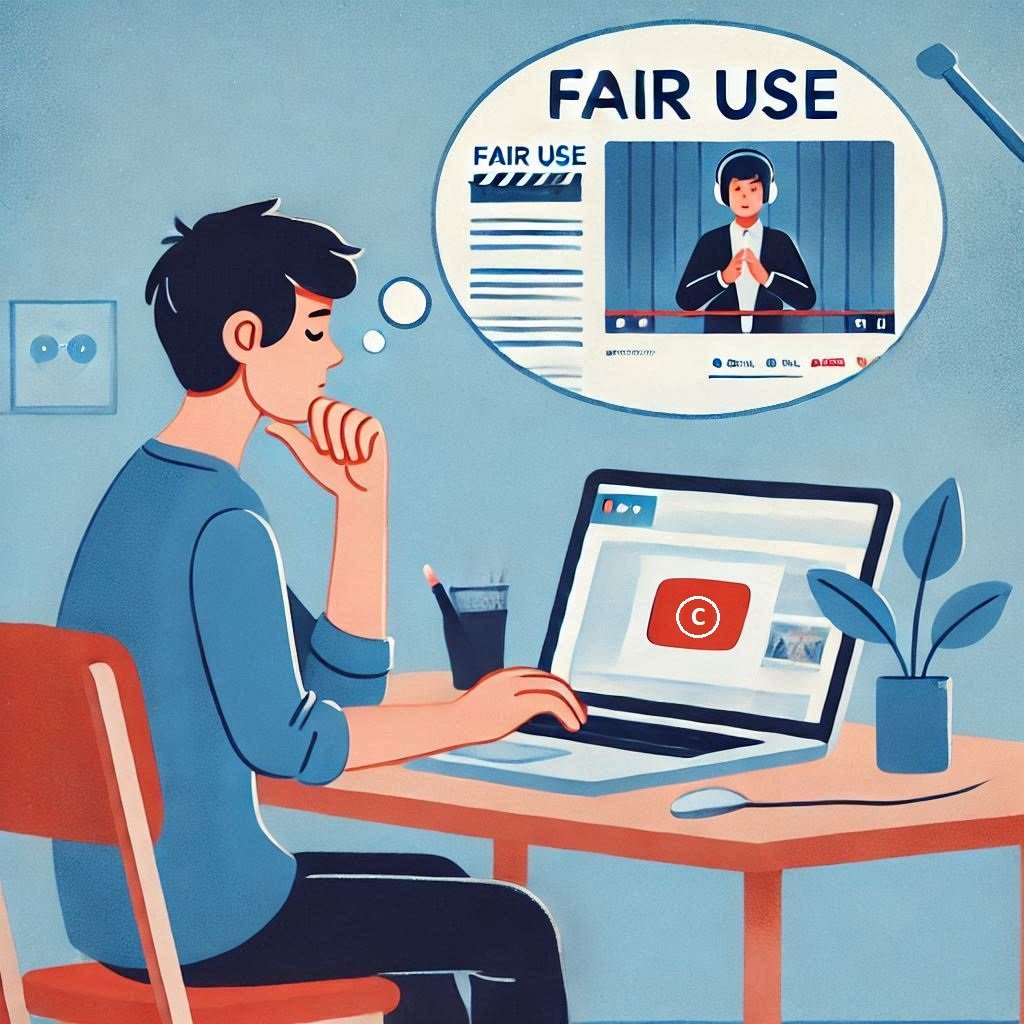Running a small business is no small feat. From managing day-to-day operations to marketing your services, there’s always something that demands your attention. But have you ever paused to think about how copyright infringement could impact your small business?
Imagine this: You use an image or a piece of music in your marketing campaign, thinking it’s free to use. Months later, you receive a legal notice demanding compensation for unauthorized use of copyrighted material. Shocking, right?
Protecting small businesses from copyright infringement is crucial to avoiding legal penalties and reputational damage. The good news is that with the right knowledge and precautions, you can protect your small business and steer clear of these challenges.
In this article, we’ll explore how to protect small business from copyright infringement, the basics of copyright laws, and the top ten (10) tips to protect your business from copyright violations. Let’s jump into the details.
What Is Copyright?
Have you ever created something original, like a logo, a blog post, or even a catchy jingle? If so, copyright is what protects your work from being copied or used without your permission.
Copyright is a form of intellectual property that gives you exclusive rights to use, distribute, and reproduce your original creations. These rights are governed by global standards like the Berne Convention and administered by organizations such as the World Intellectual Property Organization (WIPO).
How Copyright Helps Protect Small Businesses?
Copyright plays a vital role in the growth and success of small businesses by offering the following rights:
Ownership and Control:
Copyright helps you keep control of your creative works. You decide who can use, share, or copy them.
Legal Protection:
It lets you take action against anyone using your work without permission. You can stop them and seek compensation.
Monetary Benefits:
With copyright, you can earn money by licensing your work to others. This means you get paid when others use your creations.
Market Differentiation:
Copyrighted content makes your business unique. It helps you stand out with special logos, designs, and information.
Prevention of Copycats:
Copyright stops others from copying your work. This ensures you benefit from your original ideas and creations.
Credibility and Trust:
Having copyrights shows your commitment to originality. It builds trust with customers and shows you value quality.
What Can Be Protected Under Copyright?
Copyright protection covers a wide range of original works. Here are some key examples:
- Literary Works: Books, articles, poems, and essays.
- Musical Works: Songs, instrumental compositions, and lyrics.
- Dramatic Works: Plays, screenplays, and scripts.
- Choreographic Works: Dance routines that are notated or recorded.
- Artistic Works: Paintings, drawings, sculptures, and photographs.
- Audiovisual Works: Movies, TV shows, and video games.
- Sound Recordings: Recorded music, podcasts, and audiobooks.
- Architectural Works: Building designs and models.
- Software: Computer programs and applications.
What Cannot Be Protected by Copyright?
1. Ideas and Concepts: You can’t copyright an idea, but you can copyright the way you express it. Example: A novel with a unique storyline can be copyrighted, but the general idea of a detective story cannot.
2. Facts and Data: Basic facts and data (e.g., statistical data, scientific facts) are free to use. Example: You can use and share statistics from a public study without infringing copyright.
3. Titles, Names, and Short Phrases: These usually aren’t protected by copyright. Example: Movie or book titles can be similar because they aren’t typically copyrighted.
What Amounts to Copyright Infringement for Small Business?

Here’s where things get tricky. Copyright infringement happens when someone uses copyrighted material without the creator’s permission. Sounds simple, right? But it can occur in ways you may not even realize.
Types of Copyright Infringement
Now let’s discuss the different types of copyright infringement which a small business must be aware of.
1. Reproduction and the Risk of Copyright Infringement:
Reproduction of original work is one of the forms of copyright infringement. But what amounts to reproduction is another big question?
Reproduction occurs when someone copies and distributes a work without the copyright holder’s permission. This can include making physical or digital copies. For example, sharing a movie online without authorization is considered reproduction infringement.
This kind of copyright infringement occurred in the case of A&M Records, Inc. v. Napster, Inc. (2001), where Napster allowed users to share music files without authorization, leading to a copyright infringement lawsuit.
2. Public Performance and Copyright Infringement Risks for Small Businesses:
Public performance is another form of copyright infringement. It happens when a copyrighted work is performed in public without permission. This can include:
- Live concerts
- Radio and television broadcasts
- Playing music in a bar, restaurant, or store
- Streaming a song to a large audience over the internet
In essence, anytime copyrighted material is shared with the public, it’s considered a public performance. For instance, playing a song at a large event without getting the right license is an example of public performance infringement.
It is very important to understand that when copyrighted material is shared with the public, it requires proper licensing, typically managed by performing rights organizations (PROs) such as ASCAP (American Society of Composers, Authors, and Publishers), BMI, or SESAC. These organizations ensure that songwriters and music publishers receive royalties whenever their music is performed publicly.
Let’s discuss a landmark case here in this regard. In the case of United States v. ASCAP (2010), the main issue was whether downloading music online constituted a “public performance” under copyright law.
ASCAP argued that each download should be considered a public performance, which would entitle songwriters to higher royalty fees.
However, the court ruled that downloading music is not a public performance but rather involves reproduction and distribution rights.
3. Derivative Works and Copyright Infringement Risks:
Another most common type of copyright infringement includes derivate works. Creating a new work based on a copyrighted work without permission falls under derivative works. This includes translations, adaptations, or sequels. For example, using a copyrighted image on a T-shirt without permission falls under derivative works. This is because it involves creating a new product (the T-shirt) based on the original copyrighted image without the necessary permission.
Let understand this type of copyright infringement with the help of one the famous case related to t-shirts and copyright infringement.
In the case of Kienitz v. Sconnie Nation, LLC, 766 F.3d 756 (7th Cir. 2014) :
- Photographer Michael Kienitz owned the copyright to a 2011 photo of Madison, Wisconsin Mayor Paul Soglin.
- Sconnie Nation, LLC used parts of Kienitz’s photo without permission on T-shirts and tank tops for a local block party.
- They altered the photo by removing the background, changing the mayor’s face to lime green, and creating a “posterized” version. Kienitz sued, claiming this use violated his copyright.
The court ruled that Sconnie Nation’s use of the photo was fair use. It reasoned that their design did not harm the market for the original photo and acted as a permissible addition, not a replacement.
The court also noted that the amount copied was minimal, capturing only a hint of the mayor’s smile and the outline of his face.
4. Distribution and Public Display of Copyrighted Content:
Distribution involves selling, leasing, or lending copies of a copyrighted work without permission. This often includes unauthorized retail or digital distribution. For example, selling bootleg DVDs of a popular movie is a form of distribution infringement.
Public display infringement involves showing a copyrighted work publicly without permission. Examples include showing artwork in a public space. For instance, displaying a copyrighted painting in a café without the artist’s consent is a form of public display infringement.
6. Digital Transmission of Copyrighted Content without permission:
Digital transmission infringement occurs when a copyrighted work is transmitted digitally, such as streaming music or video without authorization. For example, streaming a movie online without permission is a form of digital transmission infringement.
Why Small Businesses Must Avoid Copyright Infringement

As a small business owner, you might think, “Copyright laws are for big companies, not me.” But that couldn’t be further from the truth. Small businesses are just as vulnerable to copyright claims as larger companies.
What’s at Stake if You Don’t Protect Small Business from Copyright Infringement?
For small businesses, even a minor copyright claim can mean financial losses and reputational harm. And let’s be honest—who has time for legal battles?
- Hefty Fines: Copyright lawsuits can cost thousands, if not millions.
- Loss of Credibility: Being labeled as someone who uses stolen content can hurt your brand’s reputation.
- Operational Delays: Legal battles take time, money, and energy—resources better spent growing your business.
For an in-depth look at the financial impact of copyright infringement, check out my blog post: “How Much Does Copyright Infringement Cost Companies?“
Top 10 Ways to Protect Small Business from Copyright Infringement

Now that you understand the risks, let’s talk solutions. Protecting your business from copyright infringement doesn’t have to be overwhelming.
Protecting a small business from copyright infringement is crucial to avoid legal issues and protect your hard-earned work. Here are the top 10 tips on how to protect small businesses from copyright infringement:
1. Register Your Copyrights
Make sure to officially register your copyrighted works with the relevant copyright office. This provides legal proof of your ownership and makes it easier to take legal action if needed.
2. Use Copyright Notices
Always include a copyright notice on your work. This can deter potential infringers by making them aware that the work is protected. A simple notice like “© [Your Business Name] [Year]” can be very effective.
3. Educate Employees and Partners
Ensure that everyone involved in your business understands the importance of copyright laws. This includes employees, contractors, and partners. Provide training on how to avoid infringing on others’ copyrights and protect your own.
4. Use Licensing Agreements
If you plan to use copyrighted material from others, make sure to obtain proper licenses. Licensing agreements clearly outline the terms of use and help avoid legal disputes.
5. Monitor Your Content
Regularly monitor the internet and other media for unauthorized use of your copyrighted works. There are various tools and services available that can help you track your content online.
6. Take Prompt Action
If you discover that your work has been infringed upon, take action immediately. This could involve sending a cease-and-desist letter or sending take down Notice. Acting quickly can help minimize damage.
7. Use Watermarks and Digital Rights Management (DRM)
For digital content, consider using watermarks and DRM technologies. These measures can help protect your work from unauthorized copying and distribution.
8. Legal Agreements with Clear Terms
When working with clients or collaborators, have clear legal agreements in place. Specify the ownership of copyrights and the permitted uses of the work created. This is often referred to as “work for hire” or “work under employment.”
9. Use Royalty-Free Images
Instead of using copyrighted images, opt for royalty-free images from reputable sources. These images are free to use and don’t require permission from the copyright holder. Websites like Unsplash, Pexels, and Pixabay offer high-quality royalty-free images. However, always check their terms of usage to ensure compliance.
10. Seek Legal Advice
Consult with a legal professional who specializes in intellectual property law. They can provide valuable advice tailored to your specific situation and help you navigate any legal challenges.
By following these steps, you can better protect your small business from copyright infringement and ensure that your creative works remain secure.
How to Defend Against Copyright Infringement

Even with all precautions, mistakes can happen. If you’re accused of copyright infringement, here’s how to handle it:
- Provide Proof of Permission: If you have licenses or permissions for the use of the work, present them to the accuser.
- Claim Fair Use: If your usage qualifies under fair use exceptions like parody, research, or criticism, this could serve as a valid defense.
- Negotiate: Many copyright disputes can be resolved out of court through negotiation or mediation.
- Consult a Legal Expert: Don’t panic. Stay calm and consult a legal expert immediately to understand your rights and options.
Conclusion: Why You Must Protect Small Business from Copyright Infringement
Copyright infringement might seem scary, but you can handle it with some simple steps. Knowing how to protect your small business from copyright infringement is not just about following the law—it’s about protecting your hard work and creativity.
A little precaution can save you a lot of trouble. Ready to take the next step? Consult an intellectual property expert today to ensure your business is 100% copyright compliant. Your peace of mind is worth it.
Disclaimer: This article is based on my research and knowledge and is for informational purposes only. It does not constitute legal advice or create an attorney-client relationship. For specific legal issues, please consult a qualified attorney.




